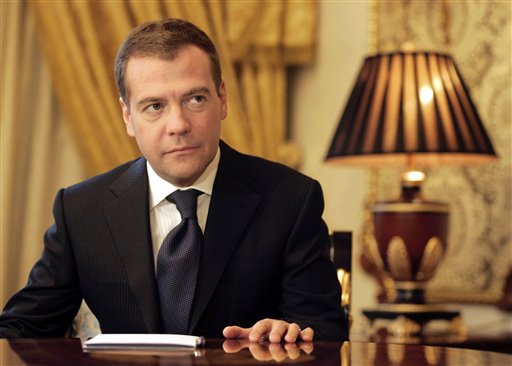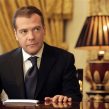
MEDVEDEV PROMISES TO PROTECT THE MEDIA, HINTS AT KHODORKOVSKY PARDON
Publication: Eurasia Daily Monitor Volume: 5 Issue: 109
By:

Those who predicted that Dmitry Medvedev’s arrival in the Kremlin would be followed by a relative liberalization or “thaw,” with real moves toward respecting press freedom and other rights and instituting the rule of law, have been given some cause for optimism in recent days.
In a joint press conference with German Chancellor Angela Merkel in Berlin on June 5, Medvedev was asked whether the issues of human rights generally and the “pardoning or freeing” of jailed Yukos founder Mikhail Khodorkovsky specifically had come up. Medvedev responded that under Russian law, there was “a procedure for pardoning someone, to which any citizen convicted of a crime (including Khodorkovsky) can resort, as well as other procedures that exist with regard to criminal law enforcement.” While stressing that “such issues cannot be resolved in discussions at the intergovernmental level or by decisions made by politicians,” he added that the “the courts … and in some cases the head of state” are “responsible for these procedures,” meaning that “it is possible to consider any appeal by any person” (www.kremlin.ru, June 5).
Medvedev’s comments on Khodorkovsky took on a special significance against the backdrop of the recent comments by Prime Minister Vladimir Putin, who told France’s Le Monde in an interview published on May 31 that while any decision on easing the conditions of Khodorkovsky’s incarceration or reducing his eight-year jail term is one that the president must make “on his own,” Khodorkovsky broke the law “repeatedly and grossly” and was part of a group accused not only of economic crimes, but murders. “This kind of ‘competition’ is not admissible,” Putin told the French newspaper. “And we, of course, will do our best to stop it” (www.inosmi.ru, June 1)
Not only did Medvedev, in contrast to his predecessor, appear to leave the door open to pardoning Khodorkovsky, but he gave a speech in Berlin on June 5 that seemed a deliberate contrast to the hard-line speech Putin gave in Munich in February 2007, in which he accused the United States of having “overstepped its national borders in every way” (AP, February 10, 2007). Medvedev told German political and business leaders in Berlin that by “overthrowing the Soviet system and rejecting its restoration, Russia has laid a basis for forming a state compatible with the rest of Europe” and that “in international affairs as well as in domestic affairs we will first and foremost insist on the supremacy of law.”
In the same speech, Medvedev declared that “all instances related to attempts on the life and health of journalists in our country will be investigated and prosecuted to the end, regardless of when they occurred” (Reuters, June 5). Just days earlier, he had asked the State Duma to scrap legislation that would have given courts the authority to close media outlets found guilty of libel, effectively sinking the bill (Moscow Times, June 4). Late last month Russia’s Constitutional Court proclaimed criminal charges brought against Manana Aslamazian, the former head of the now-closed Educated Media Foundation, to be unconstitutional. Aslamazian faced up to five years in prison for failing to declare foreign currency when returning to Moscow from Paris in January 2007, and the foundation was forced to shut down after police raided its office in Moscow. International press watchdog groups like the Committee to Protect Journalists welcomed the Constitutional Court’s ruling (www.cpj.org, June 3).
Meanwhile, the Moscow Prosecutor’s Office ruled on June 5 that city authorities acted unlawfully in banning an opposition “Dissenters’ March” in the Russian capital on May 6. According to human rights activists, in so ruling, the Moscow prosecutors also essentially recognized the arrests of activists who tried to demonstrate that day as unlawful (“Vlast,” RTVi television and Ekho Moskvy radio, June 6). A police source told RIA Novosti on May 6 that 11 people had been detained for attempting to organize a march.
Still, some observers have warned against reading too much into these seemingly positive developments. First of all, Medvedev, perhaps attempting to cover his right flank, took a page from Putin and used a speech to the St. Petersburg International Economic Forum on June 7 to blame the United States for the current global economic crisis (Moscow Times, June 9). And while Medvedev was touting his new version of glasnost, on June 4 officers from the Moscow police’s anti-economic crimes department reportedly raided the offices of the Russian Media Group (Russkya Mediagruppa), Russia’s largest radio holding company, with the company’s Russkaya Sluzhba Novostei (Russian News Service) radio station being taken off the air at the same time (www.gazeta.ru, www.newsru.com, June 4).
“Thus far with some share of certainly, one thing can be said: things have not gotten worse with the arrival of Dmitry Medvedev,” wrote Yezhednevny Zhurnal deputy editor Alexander Golts. “And that’s all. As for the sizeable quantity of correct words said by the new president, open any of the eight Putin speeches to the Federal Assembly [Russia’s parliament] and you will easily discover both these and many other absolutely correct words.”
Golts added: “Modernization carried out from above has its own laws. One of these is that such a modernization must be carried out by officials who clearly realize that it is absolutely necessary. It is not a coincidence that as a rule, this takes place as the result of a crisis–a defeat in war or an economic collapse. When an official understands that, reformation will save him as well. Without all of that, he considers all the beautiful appeals, even those delivered in the form of laws and instructions, as lordly caprice. And thus far there is absolutely no basis to believe that it will be any different this time” (www.ej.ru, June 6).




